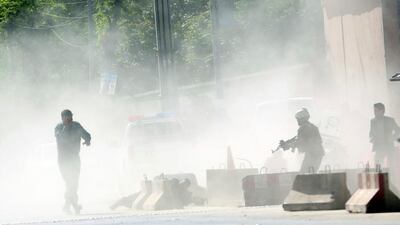A co-ordinated double suicide bombing claimed by ISIS killed at least 25 people in central Kabul on Monday morning, including nine journalists.
In a separate incident on Monday, a suicide attack killed at least 11 children in an attack on a foreign military convoy in Kandahar, southern Afghanistan. Sixteen people were wounded in the attack, including Afghan and foreign security forces. No group has yet claimed responsibility.
Afghan officials said the bombing targeted a NATO convoy and killed 11 children at a religious school located just by the roadside from where the explosion took place. At least 16 people were wounded, including NATO soldiers, Afghan civilians and policemen.
Gen. John Nicholson, commander of NATO's Resolute Support mission, said "our thoughts and prayers are with those wounded, and with the innocent Afghans whose lives were needlessly taken from them by the enemies of Afghanistan."
In Kabul, the first bomb blast was detonated by a militant on a motorcycle near the Afghan intelligence agency.
A Kabul police spokesman confirmed the casualty toll as 25 killed and 45 wounded.
Wahid Majroh, the Public Health Ministry’s spokesman, had earlier said that at least 21 people were killed and 27 people were injured in the attacks.
In a statement issued via its propaganda agency Amaq, ISIS said two suicide bombers had targeted the Kabul headquarters of Afghanistan's intelligence services.
AFP said that its chief photographer in Kabul, Shah Marai, was killed in a blast that was targeting a group of journalists who had rushed to the scene of the earlier suicide attack.
In a statement, the news agency's chairman Fabrice Fries said that Marai was "a great photographer" and a "wonderful person" who covered traumatising events with "sensitivity and professionalism".

PICTURES: Afghanistan, through the lens of Shah Marai
Sediqullah Tawhidi, an official from the Afghan Journalist Safety Committee, said a cameraman from the local TOLO TV also was killed. Police officer Jan Agha said the journalists died in the second blast, which also wounded two police officers.
The suicide attacks took place in the central Shash Darak area, which is home to the Nato headquarters and a number of embassies in Afghanistan. The second was meant to hit those rushing to the scene of the attack to help the victims of the first blast.
________________
Read more:
Afghan Taliban announces spring offensive in another blow to peace hopes
Taliban suicide bomber kills six in Helmand as spring offensive begins
________________
The bomber appeared to have deliberately targeted journalists, presenting a press card to police before joining the group standing near the first blast site, interior ministry spokesman Najib Danesh said.
Journalists covering the blast were standing near the site of the explosion when the bomber struck, killing seven people and wounding several, to of whom later died.
Among a litany of setbacks since the Taliban were ousted in 2001 and tens of thousands of deaths, Afghanistan's lively and independent media sector has stood out as a success but it has suffered heavy losses.
According to the Afghanistan Journalists Safety Committee, at least 80 journalists and media workers have been killed working in the country since 2001.
But there had never been a day when so many were killed in the same attack.
Globally, it was the worst attack on journalists in a single incident since 31 reporters and photographers were killed in a massacre in the southern Philippines in 2009.
Kabul chief of police Dawood Amin said the area of Kabul that was targeted, which includes many foreign offices, was quickly sealed off. Mohammad Mousa Zahir, director of Wazir Akbarkhan Hospital, said several people suffering injuries from the blasts were being treated at the hospital.
ISIS has grown in influence in the country that has been wracked by war since the US invasion in 2001. The Taliban has continued to launch assaults on Afghan security and police forces, and most recently announced its annual spring offensive. But ISIS has carried out some of the deadliest attacks on civilians in Afghanistan in recent years, including a twin bombing in July 2016 that left at least 97 people dead in Kabul.




